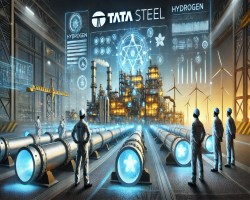UPSC Current Affairs
| Science and Technology |
|---|
|
|
|
Why in the News?
Tata Steel, one of India’s leading steel manufacturers, has achieved a significant milestone in the clean energy sector by developing India’s first hydrogen-compliant pipes. These pipes are specifically designed for transporting hydrogen, supporting India’s transition to green energy and aligning with the National Hydrogen Mission. Key Takeaways: First-of-its-Kind Innovation: Tata Steel is the first Indian company to develop hydrogen-compliant pipes, marking a major breakthrough in energy infrastructure. Advanced Steel Manufacturing: The newly developed API X65 pipes were manufactured at Tata Steel’s Khopoli plant using steel from its Kalinganagar facility. Hydrogen-Ready Technology: The pipes are designed to transport 100% pure gaseous hydrogen under high pressure (100 bar). Boost to National Hydrogen Mission: This development contributes to India’s goal of producing 5 million metric tonnes (MMT) of green hydrogen annually by 2030. Global & Domestic Market Potential: The demand for hydrogen-compliant steel is expected to rise significantly, requiring over 350,000 tonnes of steel in the next five to seven years. Do You Know? Hydrogen as Clean Energy: Hydrogen is a zero-emission fuel that produces only water when used, making it a key component of the global clean energy transition. Steel Pipelines: Steel pipelines are one of the most cost-effective and efficient methods for transporting hydrogen over long distances. Tata Steel’s Expertise: The company has a long history of developing advanced steel grades, including the successful testing of ERW (Electric Resistance Welded) pipes for hydrogen transportation. Static Points About Hydrogen-Transport Pipes: Developed by: Tata Steel. Type: API X65 pipes for transporting 100% pure gaseous hydrogen. Pressure Capacity: Designed to withstand 100 bar pressure. Manufacturing Facilities: Khopoli (pipe processing) and Kalinganagar (steel production). Applications: Transportation, power generation, and manufacturing industries. Alignment: Supports India’s National Hydrogen Mission and global clean energy goals. Advantages of Hydrogen-Compliant Steel Pipelines: Cost-Effective & Scalable: Compared to other transport methods, steel pipelines offer a lower-cost, efficient solution. Ensures Safe Transport: Hydrogen-compliant steel resists corrosion and embrittlement, key challenges in hydrogen transportation. Critical for Energy Transition: These pipelines enable the large-scale distribution of hydrogen, supporting industries like transport, power, and manufacturing. Tata Steel’s Commitment to Innovation & Sustainability: Expertise in Advanced Steel Grades: Tata Steel has pioneered steel innovation, including ERW (Electric Resistance Welded) pipes, which have been successfully tested for hydrogen transport. Contribution to Green Energy Goals: The company is committed to developing sustainable solutions for India's growing clean energy sector. Leadership in Clean Energy Transition: Tata Steel’s innovation positions India as a global leader in hydrogen transportation technology. The Road Ahead for Hydrogen in India: Building a Hydrogen Economy: The National Hydrogen Mission aims to develop a robust hydrogen ecosystem from production to utilization. Public-Private Collaboration: Scaling up hydrogen adoption requires government, industry, and research partnerships. Investment & Policy Support: Future success will depend on strong investments in R&D, infrastructure, and favorable policies. Conclusion: Tata Steel’s development of hydrogen-compliant pipes is a game-changer in India’s clean energy landscape. By pioneering advanced steel solutions for hydrogen transportation, the company is driving India’s transition to a hydrogen-based economy, fostering sustainability, innovation, and energy security. |
| >> More UPSC Current Affairs |
